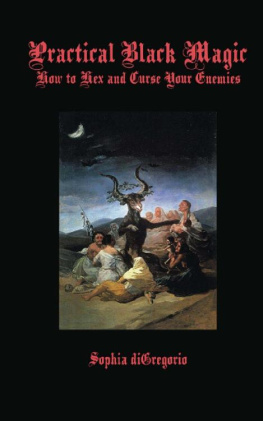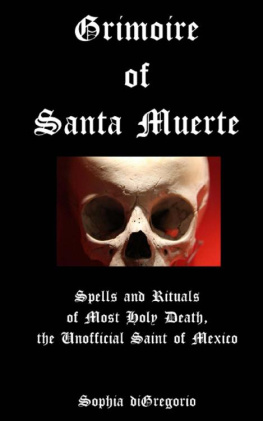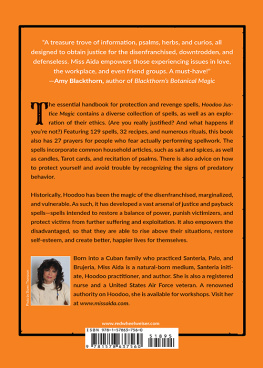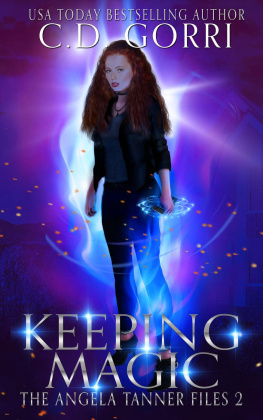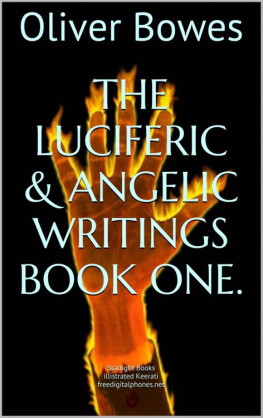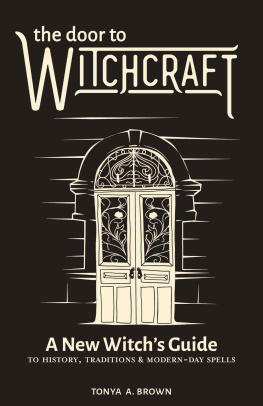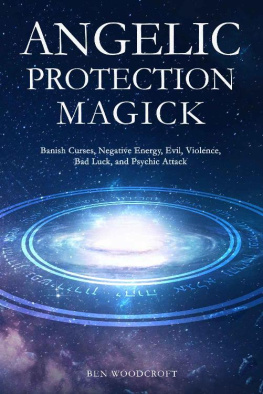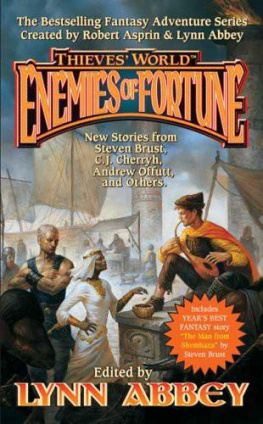Practical Black Magic: How to Hex and Curse Your Enemies
by Sophia diGregorio
Copyright 2012 by Sophia diGregorio
Smashwords Edition
Winter Tempest Books
All rights reserved.
Discover other titles by Sophia diGregorio at Smashwords.com:
Sophia diGregorio's Smashwords Page
Smashwords Edition, License Statement
This ebook is licensed for your personal enjoyment only. This ebook may not be re-sold or given away to other people. If you would like to share this book with another person, please purchase an additional copy for each reader. If you are reading this book and did not purchase it, or it was not purchased for your use only, then please return to Smashwords.com and purchase your own copy. Thank you for respecting the hard work of this author.
Practical Black Magic: How to Hex and Curse Your Enemies Copyright 2012 by Sophia diGregorio. All rights reserved. No part of this book may be used or reproduced in any manner whatsoever without written permission from Winter Tempest Books except in the case of brief quotations embodied in critical articles and reviews.
Contents
Chapter 1. What is Black Magic?
The term, "black magic," means different things to different people, although, it is commonly defined as magic with an evil, nefarious or selfish purpose. The definition of black magic used in the context of this book is "malefic witchcraft," which is intended to cause harm, although the judgment of whether it is evil or not is a subjective one.
It frequently involves the invocation of spirits, although this is not always the case. It is nearly always socially unacceptable and its existence is both denied and feared by the ignorant. Black magic is not devil worship, nor is it necessarily Satanism.
Western Ceremonial Magic is believed by some people to be black magic, but this is not necessarily true, although it certainly can be used for malefic purposes.
There are those who believe all Santeria, Vodou, Hoodoo and other practices that have an African origin to be black magic. But, this is not true, either. A negative impression of African spiritualism was given by Christian writers as an excuse for perpetrating atrocities on the people who practiced it. Some African-based spiritual practices are ancient and involve things many modern people find unpleasant, but this does not necessarily make them black magic.
Black magic may have been the first form of witchcraft since the further back its history is traced, the more dark and malefic it becomes. It is easy to imagine that the first act of a witch was one of malice, possibly the Evil Eye, against someone who gravely wronged him or her.
While black magic is by definition harmful, the greatest protective and healing power, also, comes from the knowledge and use of it. Around the world, wherever malefic witchcraft exists there are those who have the knowledge and ability to heal its effects. The witch doctor, root doctor or healer is regarded as the opposite of the black magician, but most often the two are one and the same because the worst nightmares created by means of black magic cannot be remedied by white (benign) magic anymore than they can be remedied by allopathy, Christian prayers or belief in God.
Black magic helps to keep the scales of justice balanced. The prevalence of injustice is often the reason for the growth of black magic. For example, black magic within the practice of American Hoodoo grew very strong and powerful under the domination of human traffickers and the supporters of African slavery.
A more current and very stunning example of this growth of malefic witchcraft can be seen in the increased number of shrines to Santa Muerte (Holy Death) in Mexico, which parallels the injustices perpetrated as a result of the drug wars. Black magic is the refuge of those in the most desperate situations who have no other recourse.
Even in countries where most people feel that justice more often than not prevails, there are always those who fall through the cracks, who are marginalized and feel powerless against the established institutions. It is a fact that even in our more open, modern culture some of the worst atrocities committed go unpunished by the law and even in cases where justice is served, the system places a great burden on the victims.
When terrible crimes have been committed, the wronged party has a natural human right to obtain justice by whatever means. Unfortunately, the law often stands in the way of justice more often than it promotes it, which may prompt a wronged person to seek redress by means of black magic. This decision is commonly derided by proponents of the status quo as "vengeful" or "vigilantism" and there is a popular tendency to see the victim who seeks revenge as always being in the wrong. The prevailing belief is that justice can only be served through the court system and that any justice not meted out by state authority is inherently wrong or evil. But, this is clearly not the case when so many crimes and injustices never even see the light of day.
Black magic is a means by which people can obtain the protection and retribution they cannot receive by conventional means. This is another way in which black magic can foster healing and balance.
Christian Dualism
This distinction between black and white magic, which is controversial even among occultists, can be attributed to Christian dualism. Early Christians, seeking to dominate everyone around them, deemed all practices that took place outside the church to be black magic. People naturally reasoned that if there was black magic, then there must be white magic, as well. But, magic itself is simply an occult science and in essence neutral in nature, just as the power that streams through an electrical circuit is neutral. It is only when it is used for malefic purposes that we consider it black magic.
There are those who argue that all magic is necessarily malefic if it affects the will of another person. They even denounce it in cases where its use is justified. They encourage the wronged party to "turn the other cheek" or prohibit them from "doing harm," while warning that some negative consequence will befall them if they do not comply. But, there is no more nefarious black magic than that perpetrated by churches and other mind control cults that seek to subvert the will of its adherents and keep them from seeking the retribution for wrongs to which they are naturally entitled.
From the dualistic perspective of monotheists, it follows naturally that if there is one God who is good, then there must be a Satan who is by nature evil. This created an "us versus them" dynamic within the religion, which causes them to perceive all that is associated with their God as good and everything else to be regarded as naturally evil.
This simplistic, adversarial black and white kind of thinking has crept into the culture to be applied to other things according to their opposite characteristics, for example, men versus women; light skin versus dark skin; and beautiful versus ugly. The same dualistic judgment of good versus evil is applied to these ideas.
Because of this deeply embedded notion of duality, it is sometimes difficult to have an intelligent conversation about black magic because the discussion itself arouses a sense of dualism in many people, which in turn causes a strong emotional response. Those who perceive themselves and their beliefs to be inherently good, tend to judge all opposing views as being inherently evil and are quick to condemn without first applying reason. This problem exists even outside the church because these ideas have saturated popular culture.
Moreover, the language has been influenced by this kind of simplistic thinking. So, language itself can become an obstacle to understanding because the popular culture has been dominated by Christians and Christian writers. When they interview non-Christians, they often characterize their practices in a dualistic way and apply terms to them only as they understand them as Christians. They, also, tend to regard all forms of witchcraft as something in opposition to their god and their religious doctrines and, therefore, evil. Obviously, this is not the case. But, because of its dualistic nature, Christianity is hostile to all witchcraft and all occult practices, except, of course, their own.
Next page
